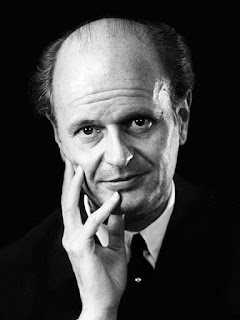Composer: Béla Bartók
- Concerto for Orchestra, Sz. 116
- Music for Strings, Percussion & Celesta, Sz. 106
RIAS-Symphonie-Orchester Berlin
Ferenc Fricsay, conductor
Date: 1957; 1953
Label: Deutsche Grammophon
-----------------------------------------------------------
Fricsay's Concerto for Orchestra is at least twice as exciting and twice as penetrating as any in my experience, save Fritz Reiner's RCA (nla). When I say that ''something is missing'' from the recordings of Dutoit (Decca, 12/88) or Previn (Telarc/ Conifer, 3/89), to give the two most recent examples, I am thinking about a very special, very personal kind of insight and imagination, about subtext and atmosphere such as Fricsay casts over the piece from bar one. His cello and bass octaves stalk the deepest recesses of the long, slow introduction, when the trumpets enter, you may for a moment stop short, such is the nature of the legato, the way in which Fricsay through-phrases their plaintive close harmonies. Every new bar has something to say. The two-by-two games of the allegretto have an almost bucolic charm, the clarinets' little song deliciously pointed, hesitant, at the ritardando, almost as if they've momentarily forgotten the words. And in the Elegia: was a solo oboe ever more plangent? Other readings sound positively tepid by comparison (except Reiner—I repeat yet again). For the rest, Fricsay makes no apology for lingering a while over the Intermezzo's sumptuous G major melody—which in a sense makes 'the interruption' that much more vindictive while the finale is so much more than merely a virtuosic celebration. The recording—32 years on—may be coarse grainy and congested but the impact of these old tapes is frighteningly immediate in their new format, and frankly, you stop thinking about sound. That's how good the performance is.
The concertos, with Geza Anda, are of special interest too, of course, though here one is considerably more conscious of advancing techniques, both in recording and, more importantly orchestral playing (a few bars of Pollini/Chicago SO/Abbado—also DG, 9/86—makes the point more dramatically than I can). The First and Second Concertos—particularly the First—are wickedly problematic as we know, and one cannot ignore here what can only be described as the air of desperation which characterizes much of the ensemble. Tempos err on the side of extreme caution, rhythms are tightly reined; the pulsating percussion which tears into the finale of the First Concerto is little short of apologetic. Yet the underlying spirit remains invincible: there is a plain-spokenness, an ethnic rawness about the sonorities. Anda illuminates all kinds of inner voices; little passing phrases, seemingly insignificant, come alive. He is no Pollini, but he and Fricsay know exactly where this music comes from.
The Third Concerto the mellower, autumnal Bartok, with no insurmountable technical hurdles to negotiate—finds them at their very best. This is a poetic work, generous to a fault, the Bachian allusions most eloquently turned. Fascinating listening, then, and as I say, if you're not familiar with Fricsay's Concerto for Orchestra, it's high time you were.
— Edward Seckerson
-----------------------------------------------------------
Béla Bartók (25 March 1881 – 26 September 1945) was a Hungarian composer, pianist and ethnomusicologist who is considered one of the most important composers of the 20th century. As an ethnomusicologist, his fieldwork with the composer Zoltán Kodály formed the basis for all later research in the field. Bartók employed folk themes and rhythms into his own music, achieving a style that was nationalistic and deeply personal. His notable works include the opera Bluebeard's Castle (1911), 6 string quartets (1908–39), the Mikrokosmos piano set, Concerto for Orchestra (1943), and 3 piano concertos (1926, 1931 & 1945).
***
Ferenc Fricsay (9 August 1914 – 20 February 1963) was a Hungarian conductor. Born in Budapest, his teachers included Hungary's most famous composers: Béla Bartók, Zoltán Kodály, Ernő Dohnányi and Leó Weiner. Fricsay spent much of his time from the 1950s onward in Germany as conductor of the Bavarian State Opera, the RIAS Symphony Orchestra, the Deutsche Oper Berlin and the Berlin Philharmonic, recording for the Deutsche Grammophon record label. He was known for his interpretations of the music of Mozart and Beethoven, as well as that of his teacher Béla Bartók and Zoltán Kodály.
-----------------------------------------------------------



Choose one link, copy and paste it to your browser's address bar, wait a few seconds (you may need to click 'Continue' first), then click 'Free Access with Ads' / 'Get link'. Complete the steps / captchas if require.
ReplyDeleteGuide for Linkvertise: 'Free Access with Ads' --> 'Get [Album name]' --> 'I'm interested' --> 'Explore Website / Learn more' --> close the newly open tab/window, then wait for a few seconds --> 'Get [Album name]'
https://filemedia.net/610926/aqKDT6930991053
or
https://uii.io/qMfBb5ul
or
https://cuty.io/sJZyAo